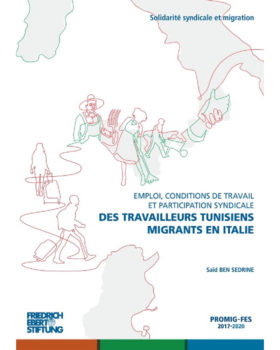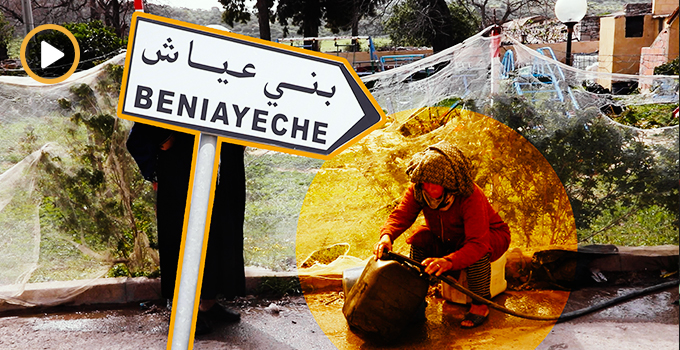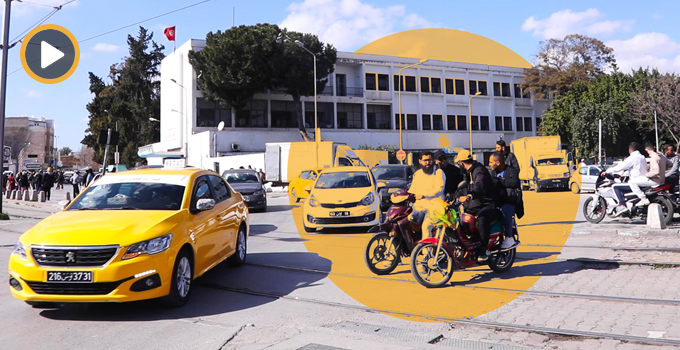And yet these dreams persist among Tunisians intent on making the crossing. Between January and July 2023, some 6,087 undocumented Tunisian migrants reached the Italian coast, versus a total of 18,000 in 2022, according to the Tunisian Forum for Economic and Social Rights (FTDES).
This migration flow is troubling for the Italian government. Over the past few months, irregular migration has been at the center of its negotiations with President Kais Saied. On July 30, President of the Italian Council Giorgia Meloni met with Saied to discuss the continuous influx of irregular migrants to her country.
Italian authorities’ anti-migrant discourse does seem to have any deterrent effect on Tunisians set on emigrating. According to the National Study on International Migration, conducted by the National Statistics Institute (INS) and National Observatory of Migration and published in 2021, seven out of ten Tunisians planning to leave the country hope to arrive in Europe. Their preferred destinations: France, Italy and Germany.

Existing support networks composed of family members and personal connections make Italy a coveted destination for Tunisian migrants. 83.3% of the world’s 566,000 Tunisian emigrants are settled on the European continent. Among them, 14% reside in Italy, making it the second host country after France.
Not all Tunisian migrants who reach Italy remain undocumented. In 2018, the number of long-term residency permits granted to Tunisians was higher than the average granted to the population encompassing all migrants from countries outside the European Union (73.1% and 61.7% respectively). These permits were primarily issued within the category of family reunification.
In 2018, only 38% of Tunisian migrants in Italy, the equivalent of 108,225 individuals, were documented. Their average age was 32 years old, according to « Employment, work conditions and union participation of Tunisian migrant workers in Italy » published in 2022 by the German foundation Friedrich-Ebert-Stiftung Tunisia and written by human resource economist Saïd Ben Sedrine.

Precarious conditions
The study examines the socio-economic situation of Tunisian migrants in Italy. 59% of Tunisian workers, a majority of whom are male, are concentrated in the northern part of the country where employment opportunities are more abundant.
Having fled their country in search of better living conditions, Tunisians who set foot in Italy come face to face with the harsh reality. Documented or not, they find themselves in a situation of extreme vulnerability.
Unemployment is high among Tunisians in Italy. In 2017, Tunisian migrants of working age (15-64 years old) had more trouble finding work than did other migrants from non-European countries. Ben Sedrine’s study reports a higher rate of inactivity among Tunisians than among all non-European immigrants combined (33% compared with 30.4% respectively).

Tunisians constitute one of the most fragile populations in Italy, with an unemployment rate (21.5%) above the average associated with all non-European immigrants combined (14.9%). Moreover, 45.5% of Tunisian youth (ages 15-29) in the country do not actively work, study or participate in any training program.
Tunisian women in Italy are no better off. 69.1% of young Tunisian women are affected by this social exclusion, in comparison with 46.3% among their non-EU counterparts.
Even Tunisians who have been in Italy for a number of years and dispose of a residency permit are not spared from job insecurity. Statistics show that their situation is comparable to that of recent arrivals to the country; in 2017, the majority (83.3%) had fixed-term contracts.
The non-European workforce, including Tunisians, is largely unskilled. 42% of Tunisian workers and 38% of all non-EU migrants fall into this category.
Agriculture and construction employ a significant proportion of Tunisian workers. In 2017, slightly more than half (52.8%) of Tunisians recruited were hired in these sectors. Often employed as seasonal workers, migrants in these professions generally do not have the benefit of job security.
For the same year, the average monthly wage across all sectors was 1,033 euros for Tunisians, and 1,057 euros for non-European Union nationalities combined. Such social marginalization is not, however, confined to Italy’s migrant population, as Italians themselves are similarly affected, the study points out.

Mafia networks
Undocumented workers are highly exposed to exploitation, the study shows. « The Italian economy is incapable of absorbing the growing number of migrants. As a result, new arrivals find themselves faced with a situation of extreme precarity », Saïd Ben Sedrine tells Nawaat. « The Italian market relies heavily upon irregular migrants to fulfill its need for workers, which the country’s official quota policy does not satisfy ». In this context, mafia networks infiltrate the market. Businesses rely on their activity in regions throughout the country.
These networks operate in a number of sectors including agriculture and construction which employ many Tunisians. The latter work eight- to 12-hour shifts for a daily wage of 20-30 euros—barely half the minimum wage set by Italy’s national collective work agreements (CNL) and provincial collective work agreements (CPL). Workers are at the mercy of the mafia, to whom they are forced to pay fees for transport (about 5 euros) and basic necessities (around 1.5 euros for water, 3 euros for a sandwich, etc.).

This exploitation begins before an undocumented migrant even sets foot in Italy. As Ben Sedrine’s study reveals, Tunisian smugglers and a network of Italian mafia orchestrate this web of human trafficking.
The role of unions
Certain Italian labor unions are fighting this exploitation. Vulnerable and faced with the complexity of legislation governing residency, Tunisian immigrants are fortunate to have the support of unions, according to Ben Sedrine. The latter help resolve issues relating to the obtention and renewal of work permits, and offer guidance concerning social protection. In fact, union membership is higher among Tunisians than it is among Italians.
In order to strengthen the protection of Tunisian workers in Italy, Ben Sedrine calls for better cooperation between Italian and Tunisian unions. This collaboration must be based on a multi-actor approach that encompasses the different stakeholders.
Such cooperation has become all the more necessary with the rise of Italy’s extreme right. « Social gains that benefit workers, such as allocations, are likely to diminish or disappear » warns Ben Sedrine. He adds, « It is true that immigrants receive low wages, but up until now they have been able to count on this social assistance. Without it, they will be even more vulnerable ».
To mitigate the conditions of precarity inherent to irregular emigration, Tunisian authorities must work to promote regular emigration. Currently, they do not fulfill this role, Ben Sedrine observes.
This policy could be adopted within Italy’s new approach which encourages regular migration. During his meeting with Kais Saied in January, Italian Minister of Foreign Affairs Antonio Tajani affirmed that his country is « ready to increase the number of regular immigrants who have received training in Tunisia to come work in the sectors of agriculture and industry » in order to « reduce irregular immigration and strengthen regular immigration ». Tajani further hopes to sign agreements with Tunisia as a means to « have regular workers, young Tunisians and Africans, to assimilate into Italian society ».
Under the partnership agreement soon to be concluded with Tunisia, Italian Ambassador to Tunisia Fabrizio Saggio announced on July 27, Italy promises to grant entry to thousands of Tunisians for work in various sectors. As Ben Sedrine explained to Nawaat, Italy’s small businesses are also facing a labor shortage.
For now, however, irregular migration is far from waning. « Tunisia cannot uphold its commitments with Italy to combat irregular immigration. Economic collapse in Tunisia will only encourage the Tunisian exodus », Ben Sedrine concludes.






iThere are no comments
Add yours